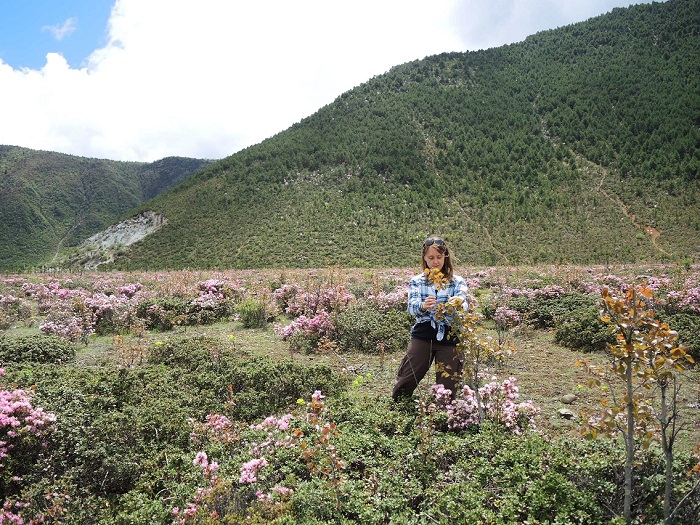University of Oxford
11a Mansfield Rd
OX1 3SZ
UK

Amy Hinsley
Background
As well as academic research I have also worked for conservation organisations for several years in a range of roles, including reviewing grant applications, working on FFI Global Trees Campaign projects for threatened tree species, and analysing the UNEP-WCMC CITES Trade Database to inform policy makers.
Research Interests

My research so far has focussed on using interdisciplinary methods to understand the behaviour of the people involved in the wildlife trade, particularly how consumers, traders and other actors interact with each other, and with policy makers and enforcement bodies. Although I have mainly worked on the trade in ornamental plants, my research at Oxford is applying some of the methods I have used to study the trade in bear bile.
Current Research
My current research focusses on disentangling the legal and illegal markets for bear bile in China, which is a component of the Oxford Martin School Illegal Wildlife Trade Programme.
This research is part of existing work established by the Chinese State Forestry Administration (SFA), the IUCN SSC Bear Specialist Group, and other partners, to address a 2012 IUCN World Conservation Congress Recommendation for research into bear bile markets in China. The project will involve the use of methods from economics, social sciences and other disciplines to understand the interactions between consumer preferences and market trends for farmed and wild bear bile, a product that has been used for thousands of years in Traditional Chinese Medicine.
Brief CV
2015-2016 Programme Officer, Species Programme, UNEP WCMC, Cambridge
2014 Project scientist, Rwanda Schools Orchid Project, Kitabe, Rwanda
2012-2016 PhD in Biodiversity Management. DICE, University of Kent. Title: Characterising the structure and formation of illegal wildlife trade networks in an age of online communication.
2012-15 Outreach Lecturer (part time), University of Kent, Canterbury
2008-12 Programme Officer, Conservation Science, Fauna & Flora International, Cambridge
2007-08 MSc Biodiversity, Conservation and Management, University of Oxford Dissertation: Conservation implications of collection and trade in wild plants in the Central Cardamom Protected Forest, Cambodia.
2007 Education volunteer (part time), ZSL London Zoo
2007 Volunteer (two weeks), Kakapo Recovery Programme, Codfish Island, New Zealand
2005-07 Fundraiser (various charities) (part time), London, UK
2003-06 BSc (Hons) in Natural Sciences. University of Durham
Awards
- Royal Horticultural Society (RHS) bursaries for trips to learn about plant horticulture and trade in La Reunion and Madagascar (2013), South Africa (2014), and China and Hong Kong (2016).
- RHS medals for educational displays at the RHS London Orchid Show in 2013 (Silver), 2014 (Silver-Gilt), 2015 (Silver),
- Presentation prizes at World Orchid Conference (Johannesburg, 2014) and International Orchid Conservation Conference (Hong Kong, 2016).
- Poster prizes at Student Conference on Conservation Science (Cambridge, 2016), and DICE ‘Future of Conservation’ Symposium (Canterbury, 2014).
Membership
IUCN SSC Global Trees Specialist Group
IUCN SSC Orchid Specialist Group
IUCN SSC Orchid Specialist Group Global Trade sub-group
Society for Conservation Biology
Published Papers
Hinsley et al. (2018) A review of the trade in orchids and its implications for conservation. Botanical Journal of the Linnean Society, 186(4), 435-455. https://doi.org/10.1093/botlinnean/box083
Hinsley, A. & Roberts, D.L. (2018) The wild origin dilemma. Biological Conservation, 217, 203-206.
Williams, S.J., Gale, S.W., Hinsley, A., Gao, J. & St. John, F.A.V. (2018). Using consumer preferences to characterise the trade of wild‐collected ornamental orchids in China. Conservation Letters, 11(5). https://doi.org/10.1111/conl.12569
Challender, DWS., Hinsley, A., Milner-Gulland, E.J. (2019) Inadequacies in establishing CITES trade bans. Frontiers in Ecology and the Environment 17 (4), 199-200.
Hinsley, A., Keane, A., St. John, F.A., Ibbett, H. and Nuno, A. (2019) Asking sensitive questions using the Unmatched Count Technique: Applications and guidelines for conservation. Methods in Ecology and Evolution.
Margulies, J., Bullough, L.-A., Hinsley, A., Ingram, D., Cowell, C., Goettsch, B., Klitgard, B., Lavorgna, A., Sinovas, P. and Phelps, J. (2019) Illegal wildlife trade and the persistence of plant blindness. Plants, People, Planet. (In Press)
Amy Hinsley and David L. Roberts. (2017) Assessing the extent of access and benefit sharing in the wildlife trade: lessons from horticultural orchids in Southeast Asia. Environmental Conservation. Cambridge Core
Hinsley A, Sutherland WJ, Johnston A (2017) Men ask more questions than women at a scientific conference. PLoS ONE12(10): e0185534. https://doi.org/10.1371/journal.pone.0185534
Hinsley, A., Nuno, A., Ridout, M., Freya A.V. St John, & David L. Roberts. 2016. Estimating the Extent of CITES Noncompliance among Traders and End-Consumers; Lessons from the Global Orchid Trade. Conservation Letters. doi:10.1111/conl.12316
Hinsley, A., Lee, T.E., Harrison, J.R. and Roberts, D.L., 2016. Estimating the extent and structure of trade in horticultural orchids via social media. Conservation Biology. 30: 1038–1047. doi:10.1111/cobi.12721
Hinsley, A., King, E. and Sinovas, P., 2016. Tackling Illegal Wildlife Trade by Improving Traceability: A Case Study of the Potential for Stable Isotope Analysis. The Geography of Environmental Crime, pp.91-119.
Hinsley, A., Verissimo, D. and Roberts, D.L., 2015. Heterogeneity in consumer preferences for orchids in international trade and the potential for the use of market research methods to study demand for wildlife. Biological Conservation, 190, pp.80-86.
Hinsley, A., Entwistle, A. and Pio, D.V., 2015. Does the long-term success of REDD+ also depend on biodiversity?. Oryx, 49(02), pp.216-221.
Hinsley, A., 2011. Notes on the trade of orchids in the Cardamom Mountains, Pursat and Koh Kong Provinces. Cambodian Journal of Natural History, p.11.
Posters
- Student Conference on Conservation Science (Cambridge, 2016)
- DICE ‘Future of Conservation’ Symposium (Canterbury, 2014).
Links
I co-chair the IUCN SSC Orchid Specialist Group’s Global Trade sub-group. Our website is here
